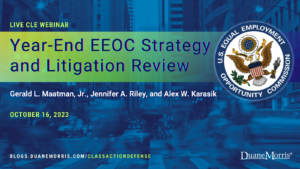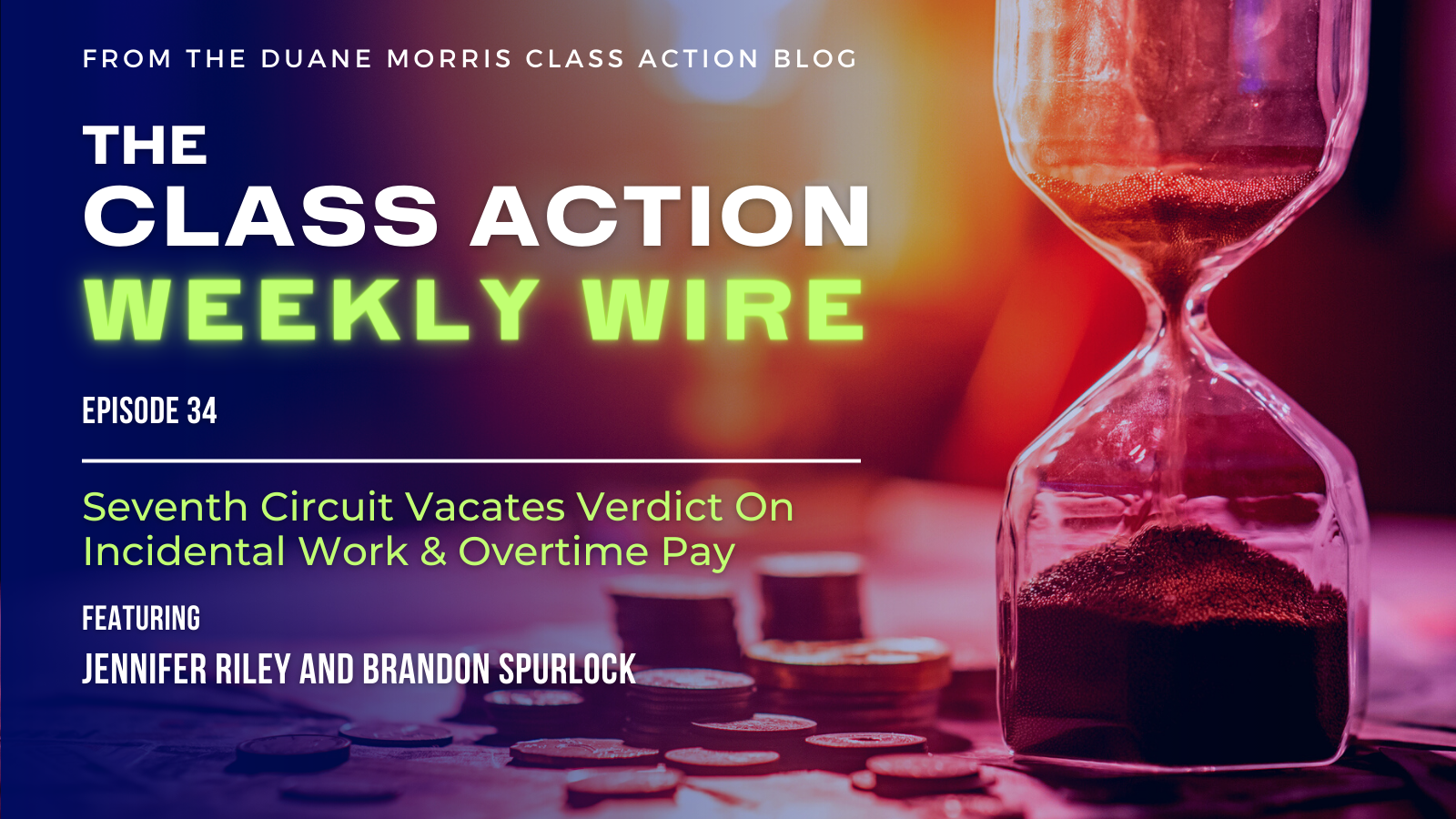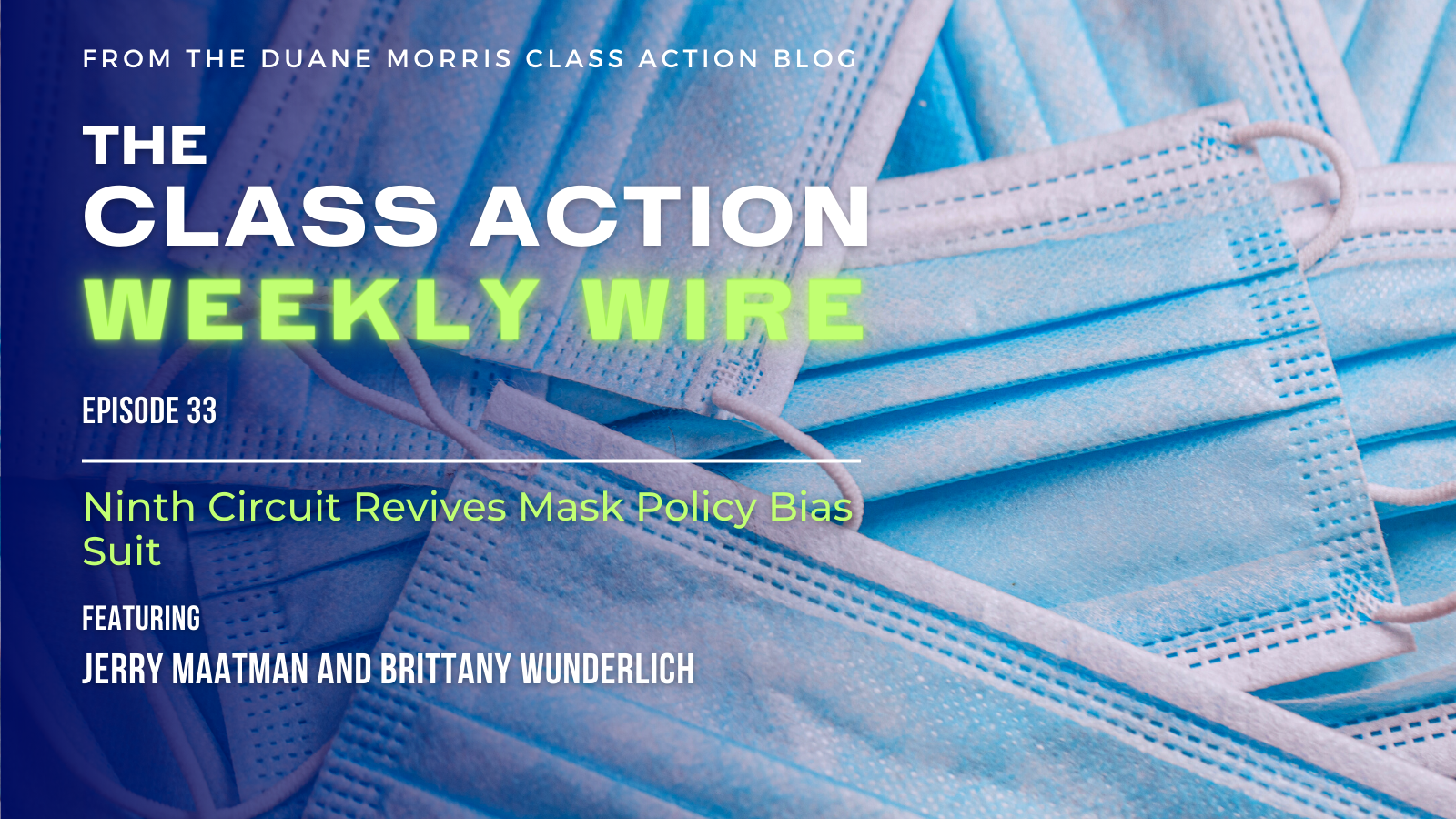 By Gerald L. Maatman, Jr., Derek Franklin, and Emilee N. Crowther
By Gerald L. Maatman, Jr., Derek Franklin, and Emilee N. Crowther
Duane Morris Takeaways: In EEOC v. Army Sustainment, LLC, No. 1:20-CV-234 (M.D. Ala. Sept. 26, 2023), Judge R. Austin Huffaker, Jr. of the U.S. District Court for the Middle District of Alabama granted in part and denied in part Defendant’s Motion for Summary Judgment. The Court dismissed the EEOC’s “failure-to-accommodate” and “screening-out” claims against Defendant, in addition to holding that only four of the EEOC’s seventeen claimants could support the EEOC’s disability bias claim. The Court also found that the Defendant employer’s policy barring employees from taking various prescribed medications was not, by itself, an adverse employment action. For employers facing EEOC-initiated lawsuits involving ADA claims alleging discrimination and failure-to-accommodate, this decision is instructive in terms of what evidence courts are apt to consider in determining whether an employee suffered an adverse employment action, as well as what is required to trigger an employer’s duty to provide a reasonable accommodation.
Case Background
Defendant Army Sustainment LLC a/k/a Army Fleet Support (“AFS”) is a helicopter maintenance contractor which, from 2003 to 2018, employed aircraft mechanicals, technicians, and other aviation specialists at Fort Novosel (previously known as Fort Rucker). Id. at 1. AFS implemented a drug testing policy (the “Policy”) in 2012 requiring employees in “safety-sensitive positions” to submit to drug testing for opioids, amphetamines, and benzodiazepines. Id. Individuals who were legally prescribed these medications were cleared to work so long as they agreed not to take their medication within 6-to-8 hours before their shift. Id. at 1-2.
In 2016, AFS eliminated the “6-to-8-hour rule,” and instead required employees to undergo a medical evaluation “to determine whether an employee’s prescription medication was appropriate for use during work hours.” Id. at 2. As part of the medical evaluation, the employee’s original prescribing doctor was asked “whether the employee was stable on their safety-sensitive medication or whether alternative medications were available that were as effective.” Id. If no alternative medications were available, and the employee was determined unable to safely work while taking the medication, the employee was deemed “disabled.” Id.
In 2016, two AFS employees affected by the Policy filed discrimination charges with the EEOC. The Commission found reasonable cause that AFS violated the ADA by “not allowing a class of individuals ‘to continue to work or return to work while taking their disability-related medications.’” Id. at 2-3. Further, the EEOC held that AFS’ Policy itself had “the effect of discrimination on the basis of disability” and violated the ADA. Id. at 3.
The EEOC filed suit against AFS on behalf of 17 AFS employees who suffered from different disabilities, but were legally prescribed medications and required to undergo medical evaluations to return to work. Id. The EEOC brought four claims against AFS, including: (1) Discrimination on the Basis of Disability; (2) Failure to Accommodate; (3) Impermissible Qualification Standard; and (4) Interference. Id.
The Court’s Decision
Timeliness Of The EEOC’s Enforcement Action
In Alabama, an employee bringing claims under Section 706 of Title VII “must file a charge with the EEOC within 180 days of the date of the alleged discrimination.” Id. at 4. Any claims filed with the EEOC after the 180-day period are time-barred. Id. AFS asserted that eight of the 17 claimants were time-barred, as their claims arose more than 180 days before the “representative charge” was filed with the EEOC. Id.
The Court found that Section 706(e)(1) precluded the EEOC “from pursuing claims that arose outside the charging period, even when those untimely claims are related to otherwise timely claims.” Id. at 5. While the parties disagreed as to what date the “representative charge” was filed with the EEOC, the Court held that any claims that arose prior to May 23, 2016 (180 days before one of the representative charges were filed), were time-barred. Id. at 6. As such, the Court dismissed seven of the claimants from the EEOC’s lawsuit. Id.
Whether Prohibiting Use Of A Medication Can Constitute An Adverse Employment Action
The Court’s first step in analyzing the EEOC’s disability discrimination claim was determining whether the claimants with timely claims experienced adverse employment actions. The Court rejected the EEOC’s argument that requiring the claimants to stop using their prescription medications was an adverse action, and held that merely being required to stop using certain prescription medications, without more, did not have a tangible adverse effect on employment of the claimants. Id. at 23. In making this determination, the Court explained that “[w]hether the employer’s conduct constitutes an actionable adverse employment action under the ADA is determined by whether a reasonable person in the plaintiff’s position would view the employment action in question as adverse.” Id. at 23.
The Court noted that while AFS required the claimants to sign a document acknowledging that their medications were “inappropriate for use in a safety sensitive work environment” and could result in discipline for employees if caught taking the medications, the Court held that “neither signing a form nor fear of termination are sufficient to constitute an adverse employment action.” Id. at 24.
The Court’s Rejection Of Unpaid Leave As A Reasonable Accommodation
The Court also considered whether AFS, as a means of providing a disability accommodation, could place employees on unpaid leave until they either received medical clearance to return to work or agreed to stop taking their medications. Id. at 25.
The Court rejected the notion that temporary leave is an accommodation rather than an adverse action. It reasoned that AFS “unilaterally forced the claimants on unpaid leave and did so without an accommodation request by the claimants or without any showing that the claimants could not actually perform their job duties either with or without their prescription medications.” Id. at 27. Thus, the Court denied summary judgment as to the claims of four AFS employees who alleged they suffered an adverse employment action after being placed on unpaid leave, and granted summary judgment in favor of AFS as to the remaining employees on this claim. Id. at 28.
Summary Judgment Universally Granted On Claims of Failure-To-Accommodate And Screening Out Employees Under The ADA
The Court further held that AFS was entitled to summary judgment against all claimants based on their failure to establish a prima facie case for the EEOC’s failure-to-accommodate claim. Id. at 37. For example, the Court found the EEOC did not show that two of the claimants made accommodation requests to AFS or how any such requests would accommodate the limitations presented by their disabilities. Id. at 36.
The Court’s penultimate holding concerned the EEOC’s claim that AFS’s drug policy constituted an impermissible qualification standard in violation of Sections 12112(b)(3) and 12112(b)(6) of the ADA by screening out qualified individuals with a disability. Id. 41-42. The Court granted summary judgment as to all claimants on the screening-out claim based on the EEOC’s failure to support its claim with statistical evidence or by showing that any of the claimants were actually terminated and “screened out” from their jobs. Id.
Finally, the Court refused to consider or grant summary judgment on the EEOC’s interference claim because AFS failed to acknowledge it as a standalone cause of action and thus did not formally move for summary judgment on that claim. Id. at 44-45.
Implications For Employers
Employers confronted with EEOC-initiated litigation involving restrictions on employee conduct outside the workplace should take note that the Court relied heavily on its assessment of whether “a reasonable person” in the claimants’ position would view the restriction in question as adverse. Further, from a practical standpoint, the Court’s refusal to grant summary judgment on the EEOC’s failure-to-accommodate claims illustrates the potential risk of trying to use unpaid leave as an attempted means of reasonably accommodating an employee’s disability.










